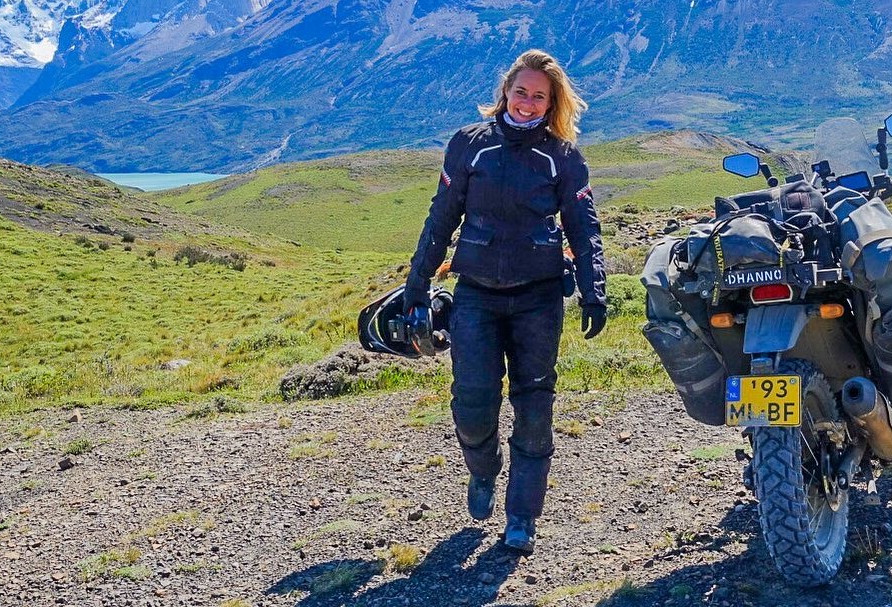
10 myths about motorcycle travel debunked
Season 5: Destination Unknown
15 August 2021When sharing your motorcycle adventures with all its ups and downs, you are bound to receive lots of advice and comments about how you should have done things differently. In The Netherlands we have a saying ‘De beste stuurlui staan aan wal’, which can be translated as ‘the best captains stand ashore’.
Receiving good advice is fantastic, but not if it discourages aspiring adventure riders to have their own! That is why I want to demystify 10 of those commonly made comments about what you should and should not do when you go on a motorcycle adventure!
1. You need at least a 600 or 700cc motorcycle for a round-the-world trip!
I used to ride a 800cc Ducati when living in The Netherlands. Definitely not a bike to go around the world with! I started my around-the-world travel with a 400cc Himalayan and later I traveled around Europe on a Honda CB500x. Now I am riding a small Honda CRF250L, named Savannah, and what a great time we have together!
I bought the Honda CRF250L because it was a reliable bike, perfect for off-road riding and it was the cheapest bike in the shop.I believe that you don’t need an expensive big motorcycle to go on an adventure. After all, it’s not the size of an engine that will bring the adventure, it’s the adventurous spirit in you that does all that!
When you prefer to cruise on tarmac, you might prefer a larger bike. All I can say is, choose the bike that works best for you and the type of journey you are planning. There are lots of bikers going around the world on a 1250cc BMW GS too. Just follow your dream and ride the motorcycle that you want (and can afford to) ride!
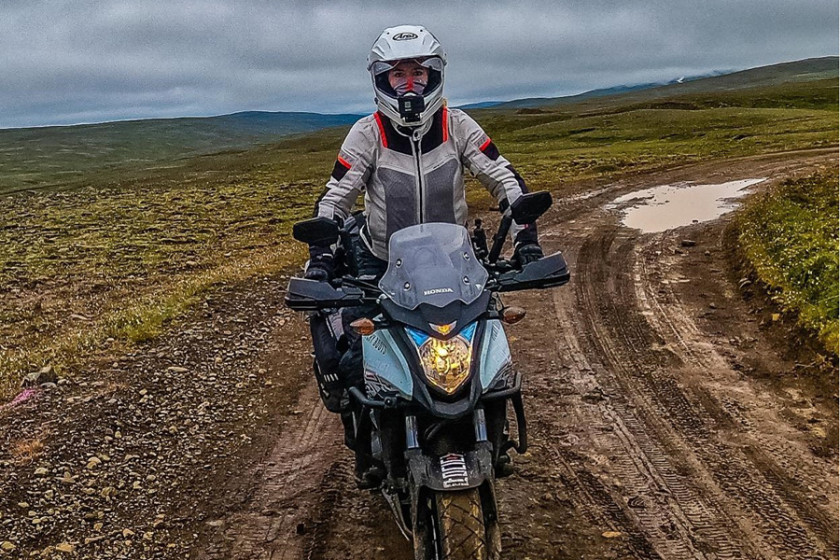
2. You need Dakar Rally Rider skills
Yes, I am addicted to dirt road riding, but do you remember when I took a dirt road for the first time? Or how I dealt with some bad road conditions in Asia? My off road riding skills were absolutely atrocious. In fact, I had never ridden roads like these before when I started my motorcycle travel! Now, after several years of riding, I am comfortable and can handle a lot more challenging dirt roads than the first ones I rode in Asia.
In Africa I encountered a lot of deep sand sections. Riding in deep sand is absolutely terrifying to say the least. Everything that you’ve learned regarding riding on tarmac, goes out of the window as soon as you hit sand.
The perfect riding technique for sand is not rocket science though. Many say that you have to stand on the pegs, lean back a little and give it full throttle. That is great advice, but at the same time, it’s terrible advice! Telling a novice dirt rider to just do what the Dakar Rally riders are doing, is simply not realistic. There is only one way to become a good rider in sand and that’s experience!
There is absolutely no shame in going slow through sand, to stick your legs out and just ‘peddle’ through it. You might get stuck sometimes, but that’s just good practice to learn how to get your bike out of sand again. The more experience you get, the more you learn about how much your bike can wobble and move under you without falling. Gaining that confidence in the bike and your own skills is essential to become a better rider.
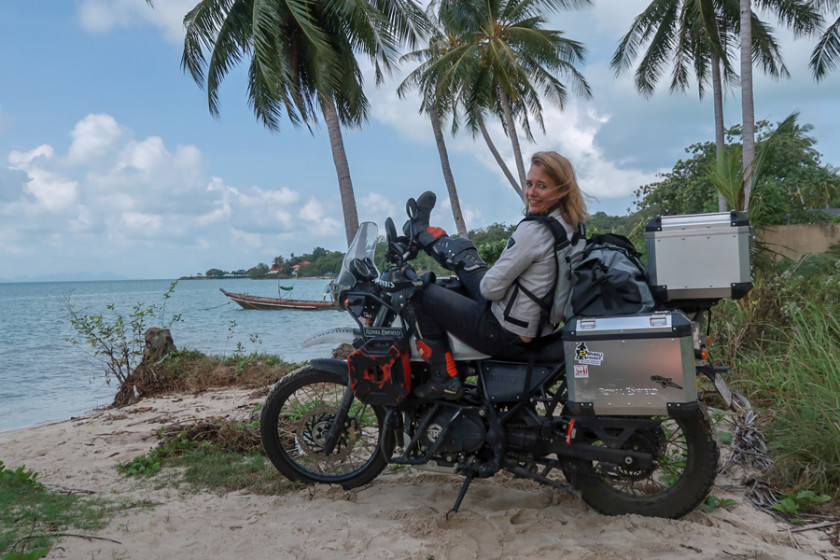
3. Guidelines are not written in stone
One of the guidelines for riding up a steep road is to stand on the pegs and give it full throttle (again!). Momentum is your friend in those situations, they say. Stopping on a steep section will make your life very difficult as continuing after that is much harder. The heavier the bike you ride, the harder it gets to gain momentum again on those steep, rocky or gravelly sections of a hill.
But, no matter how true this guideline is, there are always other aspects to consider when riding up a steep hill that are at least as important. Because, when you are doing some technical hill climbs near your town and you have cell phone reception along the way, or when you travel with a group of friends, you can take more risks than when you are riding alone, in a remote area without cell phone reception. Circumstances have to be taken in consideration too, not only guidelines for riding techniques.
The most important thing is to get your bike and yourself through an adventure in one piece. That may require a different approach, because when you go faster, your crash will be harder too.

4. Traveling alone is lonely
Many people worry about traveling alone on a bike. Will it be safe? Are you not going to be lonely?
There is an essential difference between traveling alone and being lonely. You’d be surprised how many people you will meet on the road and the amount of new friends you can make. Alright, some countries are so sparsely populated, like Namibia, that it can feel as if the only people you’ll meet are the petrol station attendants!
But the reality remains that solo travellers are much more approachable than people that travel in groups. That means that you don’t have to make an effort to meet local people, they will make sure to meet you!
For me there is no other way than solo travel, it’s what I’ve always done. Besides the advantage of always being able to follow your own plans, traveling alone also pushes you to face every struggle by yourself. You’ll learn that you are a lot more capable than you might iniatially think, and eventually you realize that pretty much any situation you face, is a situation that you can handle. Traveling alone is good for your self confidence, and for that alone, I highly recommend everyone to go on a solo trip at least once in their lifetime!

5. Hard panniers are the best
In the last few years, I feel like there is a shift towards soft panniers, but this certainly wasn’t the case when I first started riding with soft panniers. I was told many times that I should have stayed with hard panniers and it was a mistake to ride with soft panniers.
The biggest advantage of hard panniers is that they are easy to lock, so your things are safe on the bike when you leave it parked somewhere. But that’s about it! I never liked the weight of hard panniers, the fact that even though they are supposedly waterproof, my belongings still ended up damp from the condense inside, and of course there is the risk of injuring a foot or leg in a fall.
Once I started riding with soft luggage, I realised that this was the way to go! Especially when you like to go off-road, I would never opt for hard luggage again.
When you go touring through a more densely populated area and when you only ride on tarmac, then hard panniers can be a good choice. But, as soon as you hit the dirt, it’s soft luggage all the way for me!
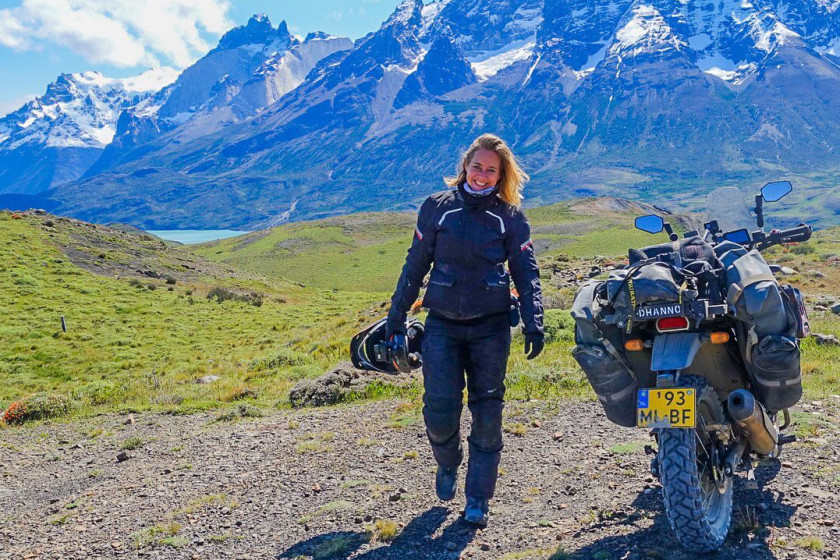
6. You should be afraid of strangers
When you are traveling alone, you are often asked ‘Are you traveling alone?’ or ‘Where are you heading to?’ In fact, ‘are you traveling alone’, is probably the most asked question during my travels, sometimes this question is being asked several times per day!
Often I receive messages in which people suggest I should always lie when answering that question. I should say that I’m not alone and my friend is coming in a few minutes. Or lie about where I’m going. People suggest this because they worry that I might be harmed once it becomes clear that I am traveling alone. Besides the fact that this question has been asked hundreds of times, and nobody ever came after me, I think that there is something fundamentally wrong with this way of thinking.
When you are traveling around the world, and you are meeting new people with such big suspicion by assuming they mean you harm, I think it is better to stay at home and not go out at all. In my view, there is no way you can see and experience the world when you are afraid and suspicious of every single person that you meet. How can you enjoy the great adventure you are on?
When you travel by yourself for a long time, you’ll develop some good intuitive skills and you’ll be able to judge when a situation is dodgy or not. If it doesn’t feel right, just make your way out of there. But once you are out there having your motorcycle adventure, you’ll see that those situations are very, very rare. So just feel comfortable and enjoy the interactions you’ll have with local people!
7. It’s only an adventure when you camp
Camping in the wilderness with your motorcycle right beside your tent while cooking food over a fire, is an ultimate motorcycle adventure dream for many.
When I traveled in Iceland and Scandinavia, I decided to bring camping gear with me to save money on lodging. To my surprise, I received several messages stating that now that I was camping, I finally was on a real adventure. Traveling 60.000 kilometers through over 30 countries hadn’t been a real adventure because I was not camping? Only then I realized how strong people believed that going on a motorcycle adventure should involve camping.
There is definitely a certain attraction to wild camping. Being able to create a home in the midst of nature, getting water from the river, cooking over a fire and sleeping under the stars is amazing! But the reality is also that you have to carry a lot of extra weight and gear with you and you spend a lot of time setting up and breaking off camp while you could also be riding your bike! And well, then there is the thing of having a shower and a comfortable bed after a long ride…
Camping in Iceland and Sweden to me, meant sitting inside my tent most of the time while it was pouring with rain outside. Most of my possessions were damp and my back was getting sore from sitting uncomfortably while I tried to some editing work. The only way to charge my laptop and drone batteries was to leave them in the toilet buildings of the campsite.
If you want to save money on accommodation and you love to camp, then definitely go for it! But don’t let anyone tell you that you are less adventurous when you rather stay in guesthouses. I think my travels and videos show that there is lots of adventure to have without going camping.
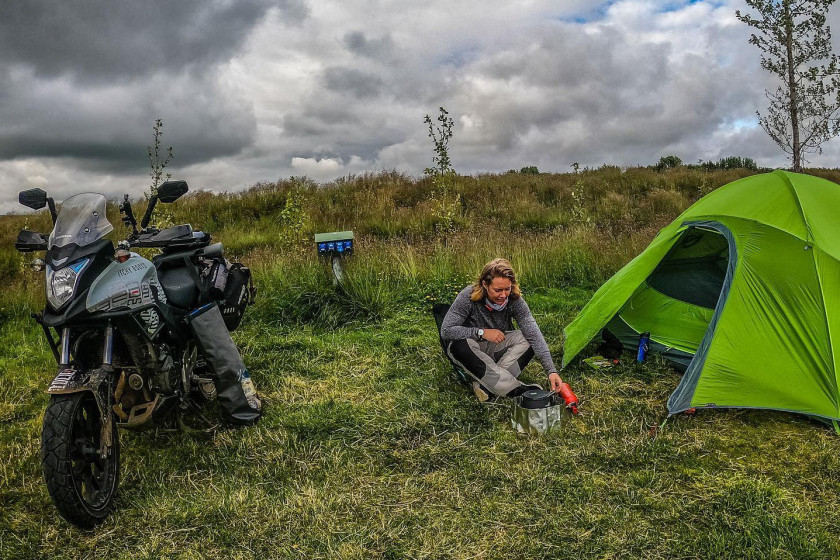
8. You should know how to fix your bike
While it would be incredibly useful to have great motorcycle mechanical skills before a long journey, you can definitely manage without them!
Of course, it’s very useful to be able to fix your own tyres in case of a flat one. But to be fair, on my first 36.000 kilometres from India to the Netherlands I couldn’t even do that. But the 4 flat tyres I got after that, I was able to fix myself, so this turned out to be quite a good skill to learn. Other basic motorcycle maintenance like cleaning out your air filter and adjusting your chain are easy to learn and good to know when you head off for a longer motorcycle adventure.
But, when it becomes a bit more technical there is absolutely no shame in going to a motorcycle repair shop to have qualified mechanics look after your motorcycle! There is absolutely no need to know everything yourself. Especially because you won’t be able to carry the tools you’d need for those repairs with you anyway. Even for something relatively simple like fixing the fork seals, you need tools that in no circumstance you want to carry with you on your trip.
I even prefer to do the oil change in a motorcycle shop. It is so much easier and faster to have it done there. When you are on the road, you don’t carry a drip tray with you to collect the old oil in. Finding a place to dispose your old oil in an environmentally friendly way, might also be challenging. Since you have to go to a motorcycle shop to buy the new oil anyway, you might as well do it over there and save a lot of hassle.

9. You should have a different set of tyres for each terrain
As I ride on all sorts of terrains, I am bound to catch some wobblies or even crashes on camera. Without a single fail, when I include a moment of struggle or slipping in my video, I receive recommendations for using a different set of tyres. No matter which tyres I am running, there are always better ones to have according to some!
Of course I would love to blame every little slip with the bike on my tyres, but I know that you can’t blame everything on your tyres. Sometimes, you just make a mistake. Or the ground is so incredibly slippery, that it really doesn't matter how aggressive your tyres are, you will struggle! Especially when you are an adventure rider, and you are basically doing dual sport: both tarmac and offroad on your trip, you’ll have to accept that you’ll never have the perfect tyre for every scenario and condition that you will encounter.
Another aspect to take into account is that when you are traveling long distances, the longevity of a tyre becomes very important too. Changing tyres every week is not an option, especially not in Namibia where there are only a handful of motorcycle shops in the entire country!
In my opinion, you’ll just have to accept that you can never have a perfect tyre for each terrain, but when you find a good all-rounder that performs well enough in all areas, and on top of that will last you 10.000 kilometers or so, then that’s the tyre you need to have!
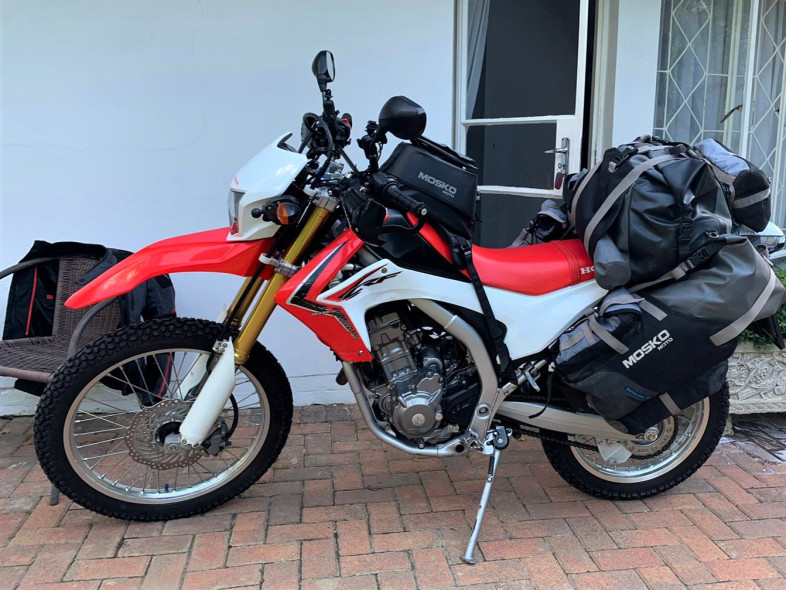
10. When you prepare well, nothing will go wrong
No matter how well you prepare, things will break, get lost along the way and you will have to change your plans again and again. Nothing in life is certain except that everything is uncertain.
How you deal with this fact is a matter of mindset. If you accept that things will turn out differently than planned, you are in a much better position to deal with whatever comes your way. When you share your adventures online or with friends, many people will give you advice on how you could have done things differently. My only advice is to forget about those captains ashore, and just know that you can never prepare for everything!
So, let's get out there, feel free and ride!
Great with mythbusting :-)
You inspired me to take my bike-license i 2022 (at the age of 55!)
I live in Denmark, and more than love to go on bike-adventures in Sweden my my little BMW G310GS :-)
Btw, the editor needs to correct the text... You did a season on a CRF300L and not af CRF250L ;-)
Hi Noraly,
Great advises! Coming from a Honda cb550 4k, a Suzuki Intruder 750, a Honda Goldwing 1100, a BMW K1200LT and until recently a BMW 1600GT I now switched to a Kawasaki Versys 650 because I wanted more fun above hp.
And while I still will be a tarmac-roadwarrior, I like the thought of having the possibility to ride through a forest or on a beach. Your adventures have certainly awakened some adventurer in me!

Hello Noraly, I haven't traveled outside of Europe yet and I've only ridden off-road very little.
I share with you my impressions on the following points.
1 You need at least a 600 or 700c motorcycle for a round-the-world trip!
I had a lot of fun riding in 125 and 250, everything is so simple, so light...
4 Traveling alone is lonely
I've often traveled alone, but I've had some wonderful and very human encounters.
7 It's only an adventure when you camp
I have camped many times with heroic, romantic moments or with great laughter.
8 You should know how to fix your bike
Yes, especially on the two motorcycles that I restored from A to Z, I know them by heart.
9 You should have a different set of tyres for each terrain.
Most of my bikes have road tires, but some adventures would have deserved trail tires.
10 When you prepare well, nothing will go wrong
I do my best for the preparations, if something goes wrong, I adapt and give myself ideas for the next time.
Jean

Dear Noraly.
I am 65 years old have ridden motorcycles for the joy of it all my life, and I did many journeys on tarmac in Europe, alone, together with my girlfriend and later with my wife as a pillion passenger. Until I got 51 years old there was no holiday trip we did in a car but on motorcycles only. I travelled on small two bikes and very big and heavy touring motorcycles and later on with a sidecar attached. We did camping, slept in hostels and with getting older we stayed in hotels for the night.
Reading your comments about advice you get from "those captains ashore" - I could have written them myself. From my point of view you are right in every aspect of it, especially the ones regarding suspicion against meeting strangers along your way. If you meet people with a positive, unprejudiced and always respectful mindset you will not be disappointed and get much more back than you have given yourself. In my experience you will automatically loose every bias' you might have had before when you engage in meeting every person on your way open mindedly.
Thanks for you valuable insides and taking us with you on your adventures.

Hallo Noraly en bedankt voor het delen. Of het nu gaat om uw reizen of uw ervaring. Dank ook voor dit artikel over de mythes rond individuele reizigers. Het is zo waar. Solo reiservaringen zijn zoveel rijker. Delen en uitwisselen zoveel vriendelijker. Ik hoop je op een dag onderweg te ontmoeten. Al blijf ik voorlopig op het Europese vasteland. Goede weg. Reg.
Hi, Noraly (and fellow commenter),
I just found this website after spending the last few weeks binging the Itch Boots youtube videos. I just wanted to say hi and thank you for sharing your content. I have found it engaging and thought-provoking.
Be safe,
RJ, from California's Central Coast

Hola Noraly, he podido ver tu solución presente a la eventualidad de tener que parar en medio de la nada. Gracias de nuevo por compartir tu experiencia.
... Noraly. Te había rebautizado! Mil disculpas.
Hola Norelya, el famoso "por si": por si en determinadas circunstancias lo necesitaras, ¿no llevas siempre en tu equipaje una tienda de campaña y un saco de dormir?
Fun opening 😜 Archive for the truth 😃10x👍… Try going to a motorcycle shop to buy less than 600cc (you hear the attitude about the “real motorcycle” in advance) Live as you want, not as others want. I would like to be in Noraly's boots even if they are itchy 🤭



